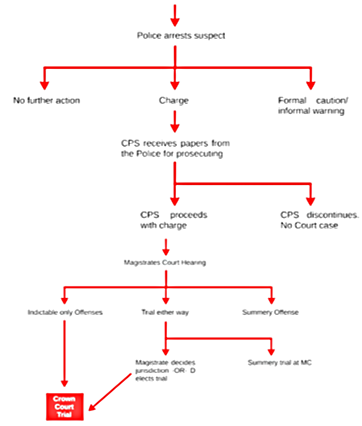Criminal Justice Process Stages
Summary
The diagram of the criminal justice process stages from arrest through final appeal can be seen on Figure 1.

Charge
The charge should be a description of the nature of the crime, its legal qualification and an indication of a specific person accused of committing this crime. An accusation is a simple, concise and clear written statement of the basic facts that make up the incriminated crime. Each charge must contain an official or customary judicial practice quote from the law, rule, order or other legislative provision that the accused is alleged to have violated. The accusation may be brought by the prosecutor either in the form of an indictment, which is submitted by him to the Grand Jury for approval, or a statement of accusation, which is submitted by the prosecutor directly to the court (Kurlychek & Johnson, 2019). Criminal prosecution for crimes punishable by the death penalty must necessarily be carried out on the basis of an indictment submitted by the prosecutor for approval by a Grand Jury. If it considers that there is sufficient evidence to bring charges, it approves the indictment and submits it to the court.
A person accused of a crime punishable by death must have a copy of the indictment at least three days before the trial, together with a list of persons summoned to the court session, jurors and witnesses put forward by the prosecution. Any other kind of crime may be prosecuted on the basis of either an indictment or a statement of accusation coming not from the Grand Jury but from the prosecutor (Kurlychek & Johnson, 2019). An accusation against several persons who participated in the commission of the same crime may be formalized by a single indictment or a statement of accusation. Similarly, an accusation of one person who has committed several crimes can be issued. The accused has the right to refuse to have evidence considered by a grand jury.
Court Hearing
In higher instances, court sessions are held by analogy with the court of first instance with their exceptions in an accelerated mode, namely: the participants in the process act on the arguments of their complaint and objections to the complaint can make additions, after which the court is removed to make a decision on the case (Chiao, 2019). Often, the participants in the process are limited in time to speak. The judge opens the preliminary session and announces the composition of the court and the secretary of the court session.
After that, the judge speaks about the name of the case on which the meeting is taking place. The judge establishes the identity of the persons who appeared at the meeting. Further, the judge explains to the participating persons their rights, as well as the right to challenge the judge and the secretary. At this stage, persons have the right to file a petition or challenge to a judge (Chiao, 2019). If petitions are filed by the participants in the process, they are resolved by the court, including removal to the conference room and the announcement of the court’s ruling.
Further, the court may clarify the circumstances of the case in the preliminary hearing, the parties may provide explanations on the case, and additional evidence may be presented in the case. The judge can find out from the parties whether there is a possibility of their reconciliation. In conclusion, the judge finds out from the parties whether it is possible to complete the preliminary meeting and appoint a hearing on the merits (Chiao, 2019). After the resolution of all petitions and clarification of the circumstances of the case, the court either postpones the preliminary hearing or appoints consideration of the case on its merits.
Trial
After all organizational issues have been resolved, the judge proceeds to report on the substance of the requirements, the circumstances and the existing objections. Next, it is necessary to find out whether the plaintiff supports their demands and whether the defendant recognizes them in the case. Moreover, at this stage, the judge should clarify whether the parties have a desire to end the case with a settlement agreement (Yanto et al., 2019). If the parties do not want to reconcile, then the speeches of the parties begin. The meeting is held in such a way that the plaintiff is first given the floor and then the defendant.
After the plaintiff and the defendant speak, the floor may be given to other parties (for example, witnesses). At the same stage, the evidence is analyzed and the results of the examination are heard. If the court is held with the participation of a prosecutor or other official representing a state agency, they should also be given the floor (Yanto et al., 2019). The main outcome of the proceedings is the adoption of a decision. This stage is the final one, and it comes immediately after the debate takes place. In order to make a decision, the court announces a break: sometimes, it takes several days. It should be noted that only those judges who took part in the consideration of the case can participate in the decision-making.
References
Chiao, V. (2019). Fairness, accountability and transparency: Notes on algorithmic decision-making in criminal justice. International Journal of Law in Context, 15(9), 126–139.
Kurlychek, M. C., & Johnson, B. D. (2019). Cumulative disadvantage in the American criminal justice system. Annual Review of Criminology, 2(5), 291–319.
Yanto, O., Rusdiana, E., Sari, N. W., & Pujilestari, Y. (2019). The role of indictment of public prosecutor in eradication of the case of corruption in Indonesian criminal justice system. RechtIdee, 14(2), 263–287.

